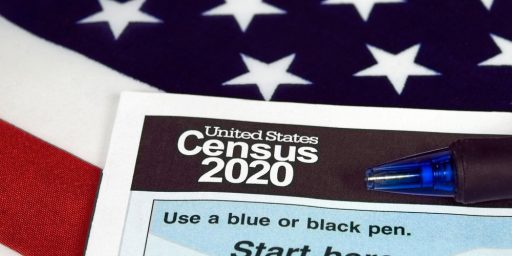Supreme Court to Review Texas Redistricting
The Supreme Court today agreed to review the constitutionality of the controversial redrawing of Texas congressional districts.
Supreme Court to Review Texas Redistricting (AP)
The Supreme Court said Monday it would consider the constitutionality of a Texas congressional map engineered by Rep. Tom DeLay that helped Republicans gain seats in Congress. The 2003 boundaries helped Republicans win 21 of the state’s 32 seats in Congress in the last election– up from 15. They were approved amid a nasty battle between Republican leaders and Democrats and minority groups in Texas. The contentiousness also reached Washington, where the Justice Department approved the plan although staff lawyers concluded that it diluted minority voting rights. Because of historic discrimination against minority voters, Texas is required to get Justice Department approval for any voting changes to ensure they don’t undercut minority voting.
Justices will consider a constitutional challenge to the boundaries filed by various opponents. The court will hear two hours of arguments, likely in April, in four separate appeals. The legal battle at the Supreme Court was over the unusual timing of the Texas redistricting, among other things. Under the Constitution, states must adjust their congressional district lines every 10 years to account for population shifts. But in Texas the boundaries were redrawn twice after the 2000 census, first by a court, then by state lawmakers in a second round promoted by DeLay.
[…]
The cases are League of United Latin v. Perry, 05-204; Travis County v. Perry, 05-254; Jackson v. Perry, 05-276; GI Forum of Texas v. Perry, 05-439.
While I joined George Will and other conservatives who chided the GOP for setting the precedent of mid-course redistricting, I don’t see how their actions were unconstitutional. Rather clearly, state legislatures have virtual carte blanche in how they draw district lines. They’re required to do it after each decennial census but there’s nothing in the language or spirit of the Constitution precluding them doing it more frequently.
Update (1455): Lyle Denniston summarizes the issues at stake:
Basically, the questions posed by the four cases break down broadly into four general areas of inquiry: validity of partisan gerrymanders, treatment of minorities under Section 2 of the Voting Rights Act, constitutionality of drawing bizarre districts in dealing with minority voters, and number limits on creation of minority-controlled districts. The Court did not rewrite the questions, thus leaving some confusion in defining what it will decide. A decisive negative ruling on any of the four general areas, though, presumably could invalidate the entire 2003 Texas plan, because all of its parts are interacting.
[…]
n the Texas redistricting cases, the Court accepted for review a total of ten questions, but some of those overlap. Here are the questions granted, case by case, using paraphrasing:
05-204, LULAC v. Perry:
1. Does it violate one-person, one-vote standards for a state to use out-of-date Census data for redistricting, when the entire purpose of the new boundary-drawing is to gain partisan advantage, resulting in a partisan gerrymander?
2. Is proof of voting along racial lines overcome by evidence of partisan affiliation of black or Hispanic voters in analyzing a claim that minority votes have been diluted under the Voting Rights Act?
05-254, Travis County v. Perry:
Sole question: Does Texas’ 2003 congressional redistricting plan, replacing a valid court-ordered plan, satisfy one-person, one-vote principles, when the redisricting was done to gain partisan advantage and used 2000 Census data?
05-276, Jackson v. Perry:
1. Is it unconstitutional, under equal protection and the First Amendment, for a state to redraw lawful districting plans in the middle of the decade, for the sole purpose of partisan gain?
2. Does the Voting Rights Act’s Section 2 allow a state to destroy a district that black voters effectively controlled, merely because it is impossible to draw a district in which blacks have an absolute population majority?
3. Under redistricting principles, according to Bush v. Vera (1996), is it unconstitutional to create a bizarre-shaped congressional district with the aim of linking two Latino-majority districts separated by a 300-mile “land bridge,” simply to avoid a racial gerrymander claim, when the new district was crafted in order to promote the goal of maximizing partisan advantage?
05-439, G.I. Forum of Texas v. Perry:
1. Is political partisanship a sufficient justification, under Section 2 of the Voting Rights Act of the Constitution, for dismantling a Latino-majority congressional district so as to elect a preferred Anglo candidate?
2. Does Section 2 permit a state to eliminate a district with a black or Hispanic majority in one area of the state and create another such district elsewhere in the state?
3. Did the District Court here err by requiring that districts, to satisfy Section 2, must be more compact and offer more chances for minority-preferred candidates to win than would be the case under the challenged plan?
4. Does the number of districts that can be created with a majority of black or Hispanic voters set a ceiling on the total number that may be drawn in order to be proportional under Johnson v. DeGrandy?
Related:






Well, there’s nothing preventing Texas from re-districting whenever it wants, but because of its history of abuse and underrepresentation of minorities (read: hispanics), the TX legislature has to get the approval of the DOJ before implementing any new redistricting to make sure it’s not illegally undercutting any minority.
The problem is that DOJ lawyers reviewed the plan and nixed it, saying it broke _every_ _single_ guideline for the definition of “fair”. Then “senior officials” at the DOJ overruled that review and ok’d the plan anyway.
_That’s_ what has the whole plan up in front of the court now…
Legion, I’m not quite sure you’re right, but I’m happy to be corrected.
Is the part about the recommendation’s being rejected actually an issue before the Court, or in the record?
It seems to me that restricting redistricting to set intervals guards against partisan abuses, but I would have to agree with JJ that the timing issue alone doesn’t seem to raise a constitutional issue. Though if the Court wears its Bush v. Gore hat, who knows?
I don’t know the details of the case but the role of a lawyers’ recommendation would be a side issue used solely to argue the larger legal question.
What matters is whether the DOJ’s decision is justified under the law, not whether the “senior officials” had authority (which they certainly did) to disregard a recommendation.
I agree that it’s not very clear in the AP article… It states that:
…but later on it refers to the redistricting case in Pennsylvania, which implied that gerrymandering wasn’t, by itself, unconstitutional. It seems pretty obvious that a state can re-district whenever it wants to, so I can’t see the timing alone making this worthy of SC review – I can only assume they’re also looking at the specific authorization of the plan by DOJ, but I haven’t seen that plainly stated in the news.
The confusion is partly over the fact that there are FOUR CASES here being argued simultaneously.
Thanks, Legion. Unless something new comes up, it doesn’t sound as though the internal DOJ mechanics are going to be before the Court. Not that they won’t be on a given Justice’s mind.
Oh well, just another whine session before the Supreme Court. The dems seem to have a manoply on whining and complaining and will stoop to anything to get a win by hook or crook.